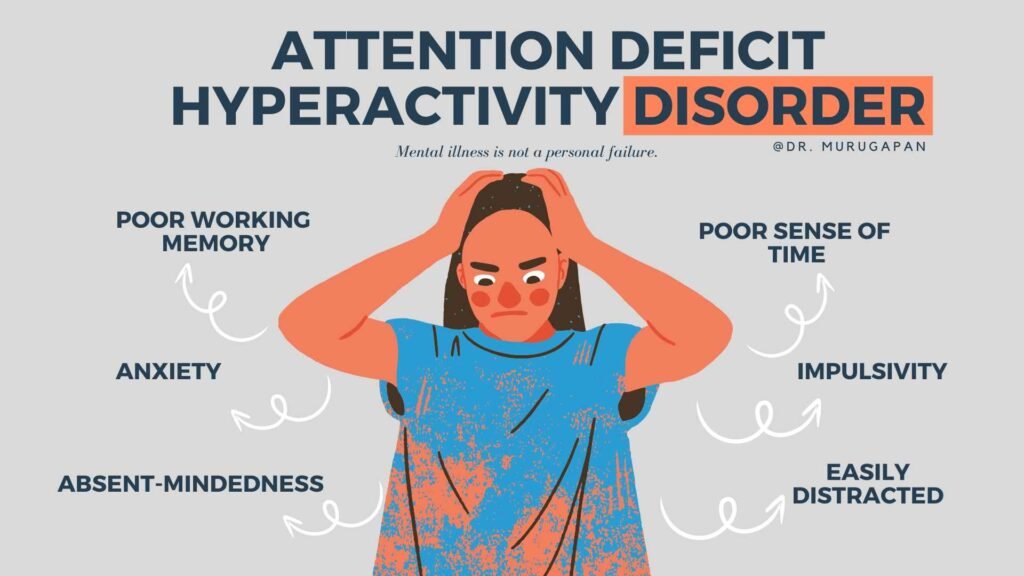
Attention Deficit Hyperactivity Disorder (ADHD) is a common neurodevelopmental disorder that affects both children and adults. Characterized by symptoms of inattention, hyperactivity, and impulsivity, ADHD can significantly impact various aspects of life, including education, work, and relationships. In this blog, we will explore the symptoms, causes, diagnosis, and treatment options for ADHD, while also discussing the importance of seeking help from reliable sources.
What is ADHD?
ADHD is often diagnosed in childhood, but it can continue into adulthood. The disorder is characterized by a persistent pattern of inattention and/or hyperactivity-impulsivity that interferes with functioning or development. Individuals with ADHD may find it challenging to focus on tasks, organize activities, or follow through with instructions. This can lead to academic struggles, difficulties in maintaining employment, and strained relationships.
Symptoms of ADHD
ADHD symptoms can be categorized into two main types: inattention and hyperactivity-impulsivity.
- Inattention: Symptoms include difficulty sustaining attention in tasks, frequent careless mistakes, difficulty organizing tasks and activities, and forgetfulness in daily activities. Individuals may often seem to be daydreaming or easily distracted by extraneous stimuli.
- Hyperactivity-Impulsivity: Symptoms include fidgeting, difficulty remaining seated, excessive talking, interrupting others, and difficulty waiting for one’s turn. These behaviors can manifest in various settings, affecting social interactions and academic performance.
Causes of ADHD
The exact cause of ADHD is not fully understood, but research suggests that genetics play a significant role. Studies indicate that ADHD tends to run in families, indicating a hereditary component. Environmental factors, such as exposure to toxins during pregnancy or early childhood, low birth weight, and premature birth, may also contribute.
Additionally, brain structure and function differences have been observed in individuals with ADHD. Research has shown that certain areas of the brain responsible for attention and impulse control may develop differently in those with the disorder.
Diagnosis of ADHD
Diagnosing ADHD can be complex, as there is no single test for the disorder. A comprehensive evaluation often includes a detailed history of the individual’s behavior, ADHD symptom checklists, and input from parents, teachers, or other caregivers. Mental health professionals may also conduct interviews and assessments to rule out other potential causes for the symptoms.
It is essential for individuals who suspect they have ADHD to seek a professional evaluation. An accurate diagnosis is crucial for effective treatment and management of the disorder.
Treatment Options for ADHD
Treatment for ADHD typically involves a combination of behavioral therapy and medication. Behavioral therapy focuses on teaching individuals strategies to manage their symptoms, improve organization, and develop coping mechanisms. This approach can be beneficial for both children and adults.
Medication is often prescribed to help manage symptoms. Stimulants, such as Adderall, are commonly used to improve focus and reduce impulsivity. If you’re considering medication, it’s important to consult with a healthcare professional who can provide guidance tailored to your specific needs. For those interested in medication options, you might want to Buy Adderall Online from reputable sources after consulting with your doctor.
The Role of Support Systems
Support systems play a critical role in managing ADHD. Family, friends, teachers, and mental health professionals can provide encouragement and understanding. Support groups can also be beneficial for individuals with ADHD and their families, offering a space to share experiences, strategies, and resources.
Education about ADHD is vital for creating a supportive environment. Many individuals are unaware of how ADHD affects behavior and learning. Raising awareness in schools and workplaces can foster understanding and accommodations that benefit those with the disorder.
Living with ADHD
Living with ADHD can be challenging, but with the right support and treatment, individuals can lead fulfilling lives. Developing a structured routine, utilizing organizational tools, and setting realistic goals can help manage symptoms effectively. Additionally, mindfulness practices and physical activity can enhance focus and reduce stress.
Conclusion
Attention Deficit Hyperactivity Disorder is a multifaceted condition that requires understanding, compassion, and appropriate intervention. If you or someone you know is struggling with ADHD, seeking professional help is crucial. With the right resources, including medication options like those available through My Pharmacy 4u, individuals can find effective strategies to manage their symptoms and thrive in their personal and professional lives.
By spreading awareness and understanding of ADHD, we can create a more inclusive and supportive environment for those affected by this disorder. Remember, seeking help is a sign of strength, and there are many resources available to assist in the journey of managing ADHD.
More to Read: https://jffortin.info/addiction-psychiatrist-helps-you-to-overcome/
 Our Gateway to Insightful Blogging Exploring Ideas, Sharing Knowledge, Inspiring Minds
Our Gateway to Insightful Blogging Exploring Ideas, Sharing Knowledge, Inspiring Minds



